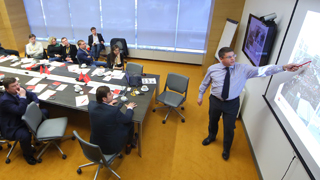
Sociale dialoog
Sociale dialoog kan worden gedefinieerd als onderhandelingen, raadplegingen, gezamenlijke acties, besprekingen en informatie-uitwisselingen waarbij werkgevers en werknemers betrokken zijn. Een goed functionerende sociale dialoog tussen uiteenlopende actoren op diverse niveaus is een belangrijk instrument voor de totstandbrenging van arbeidsvoorwaarden. De sociale dialoog brengt de belangen van werknemers en werkgevers in evenwicht en draagt bij aan het economische concurrentievermogen en de sociale samenhang.
Recentelijk is in de beleidsdiscussie op Europees niveau naar voren gekomen dat er, voornamelijk sinds de crisis van 2008, nieuwe debatten over sociale rechtvaardigheid, democratie, kwaliteit van werk en nieuwe modellen van arbeidsverhoudingen zijn ontstaan, die een uitdaging vormen voor de traditionele arbeidsverhoudingen en systemen van sociale dialoog.
Dertig jaar na de historische inauguratie van de Europese sociale dialoog in Val Duchesse te Brussel, heeft de Commissie het proces nieuw leven ingeblazen met de lancering van een nieuwe start voor de sociale dialoog tijdens een evenement op hoog niveau dat socialepartnerorganisaties uit heel Europa op 5 maart 2015 samenbracht. De Europese sociale dialoog is een instrument van het Europees sociaal beleid, dat rechtstreeks bijdraagt aan het vormgeven van arbeidswetgeving en -beleid op EU-niveau.
- Evenement van de Europese Commissie: Een nieuwe start voor de sociale dialoog
- Blogartikel: From Val Duchesse to Riga: how to relaunch social dialogue? (Van Val Duchesse naar Riga: hoe kan de sociale dialoog opnieuw worden gelanceerd?)
















